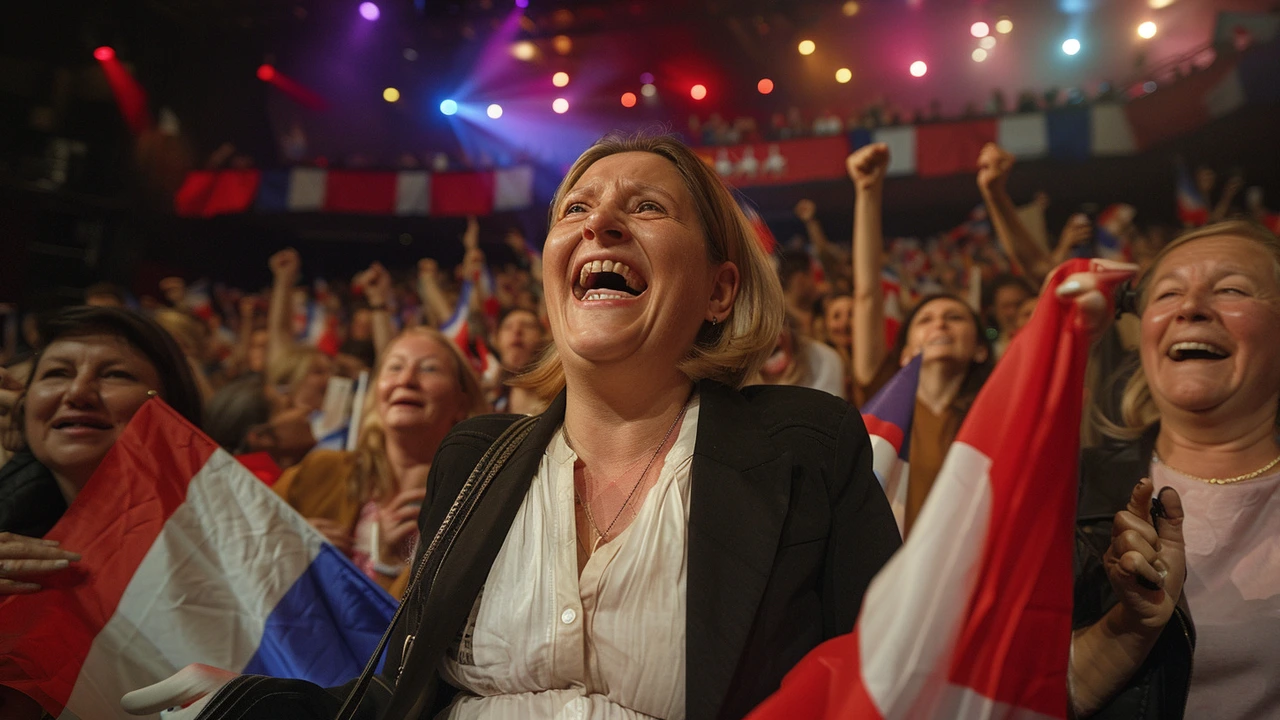Far-Right Rises in Historic France Election: Implications for Macron and the Nation's Future

In Politics
Historic Rise of the Far-Right in France's Legislative Elections
In a landmark event in French political history, the far-right National Rally (RN), led by Marine Le Pen, achieved an unprecedented victory in the recent legislative elections, securing 33% of the vote. This historic result signals an immense shift in France's political landscape, as the RN establishes itself as a major force in the nation's political arena. The political reverberations of this victory are profound, marking a significant setback for President Emmanuel Macron's centrist alliance, which trailed at 20%, and a coalition of left-wing parties, which garnered 28% of the vote.
The elections saw a high voter turnout of nearly 60%, a factor that contributed to the unpredictability of the results. The success of the RN was not entirely unforeseen; pre-election polls had suggested a formidable challenge to Macron's party, underscoring the growing influence of the far-right in France. However, the actual results have sent shockwaves through the nation and beyond, signaling a potent shift in political dynamics.
Political Fallout and Strategic Alliances
In the immediate aftermath of the election results, Macron's Prime Minister, Gabriel Attal, openly acknowledged the looming presence of the far-right at the gates of power. He stressed the urgent need to prevent their further ascendancy. The focus now turns to the second round of voting scheduled for July 7, where the left and center factions will attempt to forge strategic alliances to counter the RN. The New Popular Front, a left-wing coalition, has already announced its plan to withdraw candidates in third-place positions to consolidate anti-far-right votes. This strategic maneuver aims to strengthen their position against the RN and mitigate the risk of the far-right gaining a stronger foothold in the French National Assembly.
The potential implications of an RN victory in the Assembly are far-reaching. If successful, it would represent a pivotal moment in France's political history, with significant consequences for the nation's future trajectory. The prospect of the far-right gaining substantial legislative power raises questions about policy directions, especially with the Paris 2024 Olympics on the horizon, an event that will focus international attention on France.

Marine Le Pen and the Far-Right Momentum
Marine Le Pen, leader of the RN, has stated that 'Democracy has spoken,' reflecting on the outcome with a sense of vindication and triumph. Her party's performance in the legislative elections is a continuation of its upward trajectory, following their success in the European Parliament elections. The RN's ability to consolidate voter support and channel widespread dissatisfaction with the status quo into electoral victory underscores their growing influence.
The election results have effectively erased the dominance of Macron's bloc, as evidenced by the substantial drop in vote share for his centrist alliance. This outcome not only challenges Macron's immediate political agenda but also casts a long shadow over his administration's future initiatives. The rise of the far-right in France is a reflection of broader trends across Europe and the world, where populist and nationalist movements have gained traction, capitalizing on public discontent and economic uncertainties.
France's Future: Uncertainty and Strategic Challenges
As France braces for the second round of voting, the political landscape is marked by uncertainty and strategic challenges. The centrist and left-wing parties must navigate a complex and volatile environment to counter the momentum of the far-right. The necessity for strategic alliances and political compromises is paramount, as the stakes are exceedingly high.
The upcoming elections will test the political acumen and unity of the left and center factions. Their ability to present a cohesive and compelling alternative to the far-right could determine the future direction of French politics for years to come. The electorate's willingness to engage in this critical juncture further underscores the importance of democratic participation and the vibrancy of France's political culture.

Impacts on International Perception and Relations
The international community is closely watching the developments in France. The outcome of these elections will have implications beyond its borders, influencing France's role in the European Union and the global arena. A victory for the far-right could shift France's foreign policy stance, aligning it more closely with nationalist and isolationist tendencies that are at odds with the country's traditional position.
Concurrently, the Paris 2024 Olympics adds another layer of complexity to the situation. Hosting the games serves as a platform to showcase France's capabilities and values to the world. The political environment leading up to this event will play a crucial role in shaping international perceptions of France, potentially impacting the success and legacy of the Olympics.
Concluding Thoughts: A Pivotal Moment for France
France stands at a political crossroads, with the rise of the far-right challenging the established order and presenting an unpredictable future. The legislative elections have underscored the importance of democratic processes and the voice of the electorate in shaping the nation's destiny. As the second round of voting approaches, all eyes are on the strategic maneuvers and alliances that will define the outcome.
The implications of these elections extend well beyond France's borders. The rise of nationalist movements and the realignment of political forces within one of Europe's leading nations will reverberate through international corridors of power. The world watches, waiting to see how France will navigate this critical moment in its history and what it will mean for the future of its people and its place on the global stage.
Write a comment